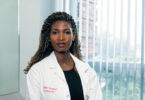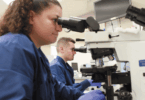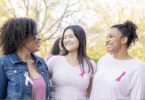When Binghamton resident Tom Ulmschneider, now 61, discovered a sizable lump on the right side of his neck, he ignored it — for just a bit. His annual physical was already on the books in two short weeks, and he’d address it then.
When Mr. Ulmschneider pointed out the lump, his doctor immediately referred him to John Abdo, MD, a UHS otolaryngologist (ear, nose and throat specialist). Dr. Abdo performed a laryngoscopy, a procedure that involves passing a thin, flexible tube with a camera through the nose and down the throat to view abnormalities.
“Dr. Abdo suspected it was my tonsils, so before I even left his office, he did a biopsy, which came back negative. But Dr. Abdo still believed it was my tonsils,”
Mr. Ulmschneider says. “His recommendation was to remove my tonsils and perform another biopsy while I was still on the operating table. If the biopsy was positive, we’d have our answer. If it was negative, he’d keep looking for the tumor source while I was on the table.”
New cardiothoracic surgeon
Fellowship-trained cardiothoracic surgeon Ahmed Khan, DO, has joined the UHS Heart & Vascular Institute. Dr. Khan has a special interest in the diagnosis and surgical treatment of lung cancer, in addition to being an expert in heart disease. “In the ‘thoracic’ part of cardiothoracic, I perform lung biopsies, stage lung cancer, and do lung resections,” says Dr. Khan. “Most cardiothoracic surgeons focus on either heart or lung, but because I am highly trained in both, I am able to bring specialized lung cancer surgery to the communities surrounding UHS.”
Dr. Kahn attended medical school at Western University of Health Sciences in Pomona, California, and completed cardiac surgery fellowships at Albert Einstein University Medical Center in New York City and at the University of California, Los Angeles.
Dr. Abdo’s instincts were spot-on. The second biopsy, performed at the same time as the tonsillectomy, proved positive. Mr. Ulmschneider had tonsil cancer. “I believe Dr. Abdo saved my life,” he says. “Another doctor might have taken the initial negative biopsy results and left it at that. But Dr. Abdo stood firm. He believed it was my tonsils and wouldn’t give up. He was right the whole time.”
Patient-Centered Care
With a cancer diagnosis confirmed, it was time to get down to business. At UHS, that means supporting patients every step of the way. A team of patient-centered doctors, nurses, therapists and other healthcare professionals contribute to the development of every patient’s care plan, which includes considering the patient’s needs, the specific cancer and treatment options.
In Mr. Ulmschneider’s case, the UHS circle of care was expanded to include his family — an emotional response to his needs. His wife, Kathleen, an ER nurse and nursing supervisor at UHS Delaware Valley Hospital, served as her husband’s advocate. “Kathleen was amazing. And my two daughters, Lauren Farrelly and Kaitlyn Degen, were amazing through the whole ordeal,” he says. “My family got me through this — and I’m grateful that my UHS cancer team welcomed and respected my family’s input through every decision.”
Integral to the UHS cancer care approach, dedicated cancer nurse coordinators and social workers are always available to consult with patients and, if desired, family members, too. The goal is to provide a seamless route to services that support a patient’s individual emotional and physical health and well-being.
This multidisciplinary approach to cancer care continues from initial screenings through recovery, with UHS medical staff members frequently meeting to share information about patient progress, issues and new developments in the field, and to review diagnosis and treatment recommendations.
“A long list of people play an important part in every patient’s cancer treatment and recovery,” says Dr. Abdo. “Collaborative communication is key before we agree on a unified treatment plan. This is how we come up with the best plan.” And there’s no cookie-cutter approach to that “best plan,” he adds. “We treat each patient as an individual, and no one is ever just a case number.”
For Mr. Ulmschneider, his post-diagnosis care began with Madhuri Yalamanchili, MD, medical oncologist at UHS Medical Oncology, who wasted no time conferring with Rashid Haq, MD, UHS oncology and radiation oncology specialist. The two physicians concurred that treatment would include three rounds of chemotherapy, then radiation, and, depending on results, possibly additional surgery to remove any remaining tumor.
Collaboration Safeguards Treatment
Because Mr. Ulmschneider’s tumor was unusually large, Drs. Yalamanchili and Haq began with aggressive chemotherapy that came with severe side effects. “He got extremely ill with the first round of chemo,” Dr. Yalamanchili says. “So we conferred with our team of oncologists as well as our gastroenterologist, who recommended a feeding tube. If a patient becomes malnourished, dehydrated or experiences severe pain, we might have to delay treatment. Staying on schedule increases our chances of things going well. It’s important that we all work together — with everyone on the team watching carefully for any indication that we need additional pain or nutrition control — so we can get the patient through treatment without a break,” Dr. Yalamanchili adds.
Careful patient monitoring and team care kept Mr. Ulmschneider’s chemo schedule on course, which gave the treatment a chance to do its job. In fact, two rounds shrunk the tumor so significantly that a third round was deemed unnecessary and the team agreed that he could move directly on to radiation.
While the radiation phase went well for Mr. Ulmschneider, the team stood ready. UHS social workers watched for any reciprocal emotional issues after such a difficult time with chemo, and nurses kept close watch on his food and liquid intake, in case IV fluids were needed.
Today, Mr. Ulmschneider is in a holding pattern, waiting for his throat to heal before having a PET scan to check results. And while he waits, he says he spends a lot of time being grateful. “Cancer stinks. But then I think about my heroes — the entire UHS medical team and, of course, my family.”
AFib Experts
UHS takes a team approach to cancer care, with physicians and nurse practitioners specializing in medical, radiation, and surgical oncology working together to develop the right treatment plan for each patient.
Madhuri Yalamanchili, MD, and Ronald Harris, DO, lead the UHS Medical Oncology team. Medical oncologists provide non-surgical care for cancer, such as chemotherapy and other drug treatments. They often serve as their patients’ point person, coordinating with surgical and radiation oncologists, as well as with other complementary and supportive services, with the help of nurse navigators.
In addition to medical oncology, UHS continues its reputation for excellence in radiation and surgical oncology. Rashid Haq, MD, leads UHS Radiation Oncology. Jeffrey Wiseman, MD, leads the surgical oncology team.
Learn more at UHS Cancer Care.







